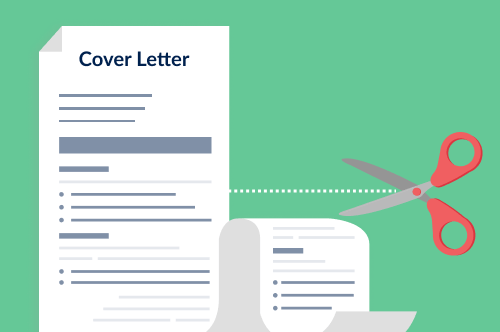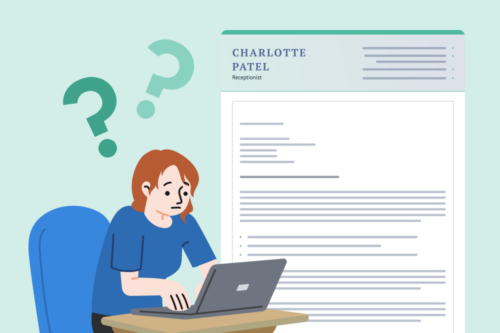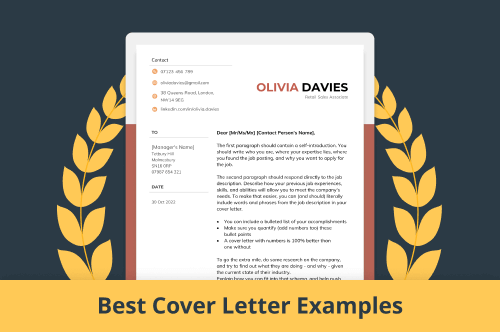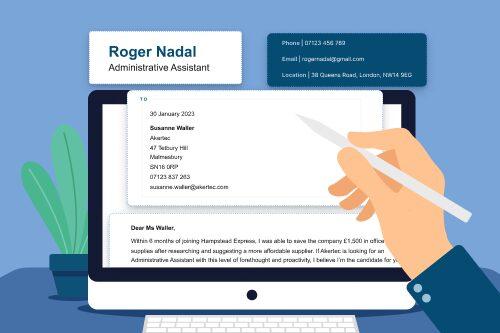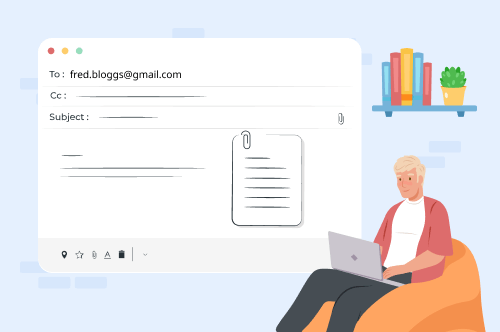A standard cover letter should be no longer than one page. But that doesn’t mean your cover letter should take up an entire page either.
So first off, here’s a quick video outlining how to write a short yet effective cover letter without any trouble:
To help you craft a compelling short cover letter for UK employers, here are a template and five short cover letter samples, followed by a few short cover letter writing secrets:
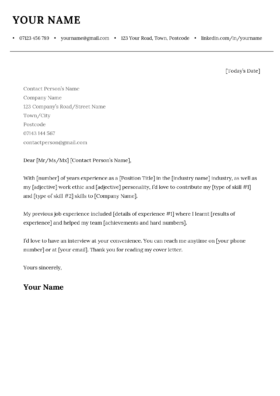
Short Cover Letter Template
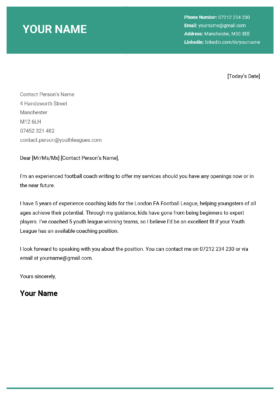


Speculative Short Cover Letter Sample
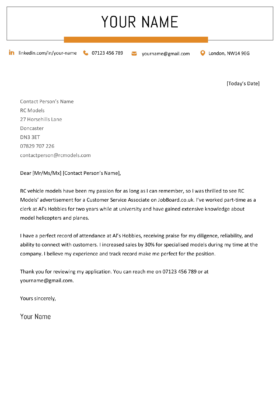


Early-Career Short Cover Letter Sample
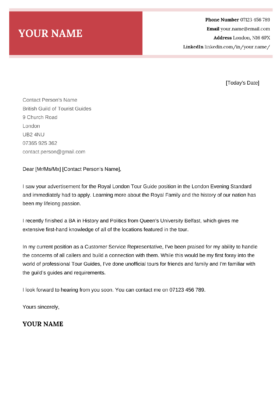


Graduate Short Cover Letter Sample
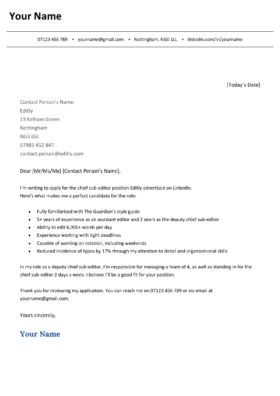


Mid-Career Short Cover Letter Sample
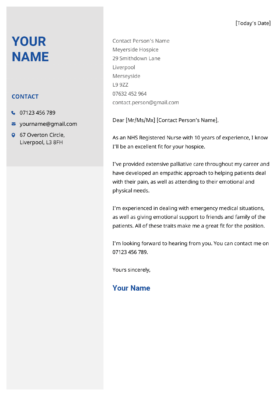


Healthcare Short Cover Letter Sample
Short cover letter template for any type of job seeker
Not sure what to put in your cover letter? Below, we’ve provided a short cover letter template you can paste into your word processor and edit to suit your job application.
To help you imagine how your experience will look in this template, the free download file also includes a short cover letter sample with the template blanks filled in.
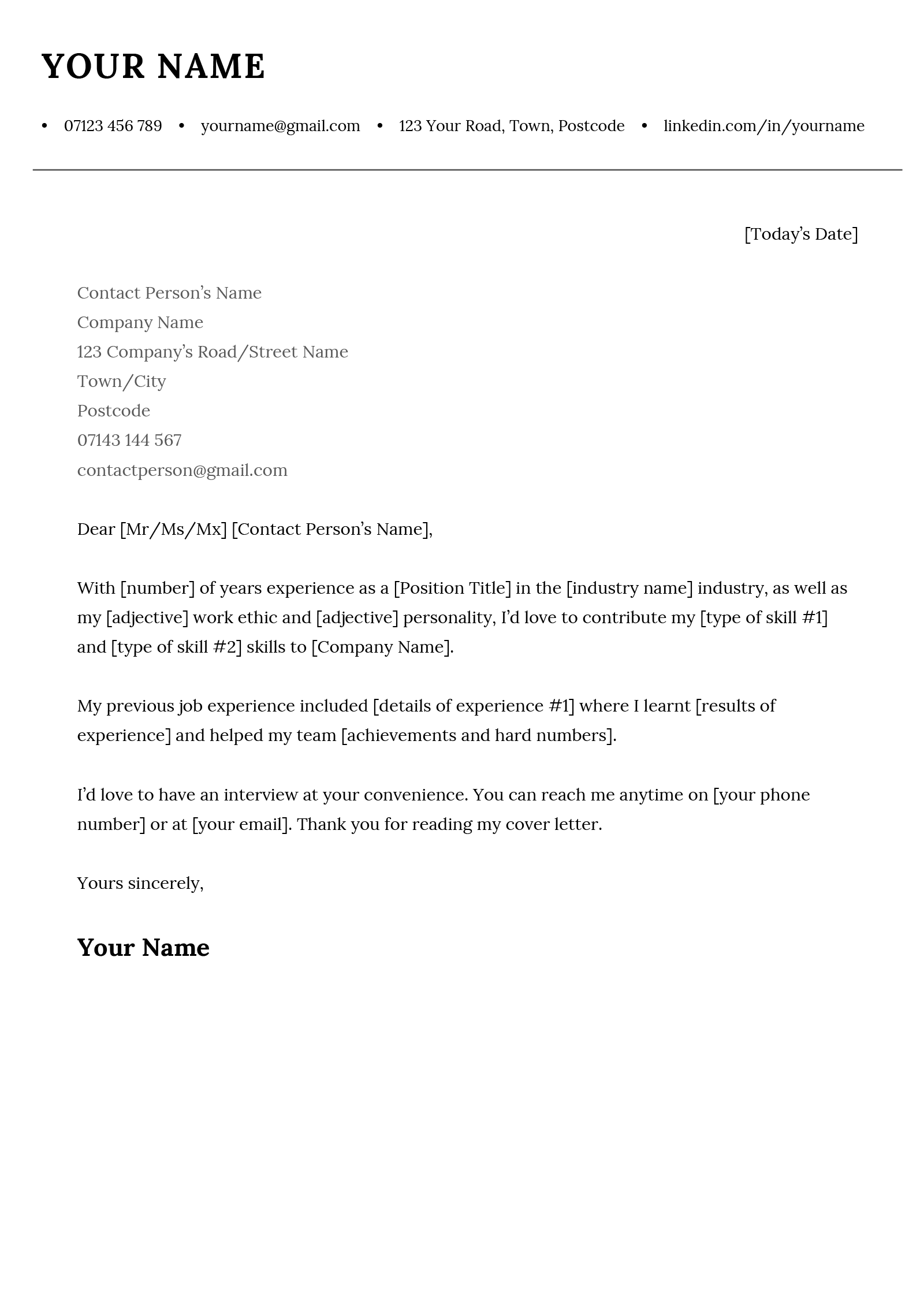

Short Cover Letter Template (Copy-and-Paste Text Version)
Your Name
Job Title
07123 456 789
yourname@gmail.com
123 Your Road/Street Name
City/Town
Postcode (for example, BS2 6WB)
linkedin.com/in/yourname
Today’s Date
Contact Person’s Name
Company Name
123 Company’s Road/Street Name
Town/City
Postcode
07143 144 567
contactperson@gmail.com
Dear [Mr/Ms/Mx] [Contact Person’s Name],
With [number] of years experience as a [Position Title] in the [industry name] industry, as well as my [adjective] work ethic and [adjective] personality, I’d love to contribute my [type of skill #1] and [type of skill #2] skills to [Company Name].
My previous job experience included [details of experience #1] where I learnt [results of experience] and helped my team [achievements and hard numbers].
[Details of experience #2] also resulted in [achievements and hard numbers]. With these experiences in mind, I think I’d be the perfect candidate for [Company Name].
I’d love to have an interview at your convenience. You can reach me anytime on [your phone number] or at [your email]. Thank you for reading my cover letter.
Yours sincerely,
Your Name
5 short cover letter samples
These five short cover letter samples have everything you need to captivate recruiters and get an interview:
1. Short cover letter sample for speculative job applications
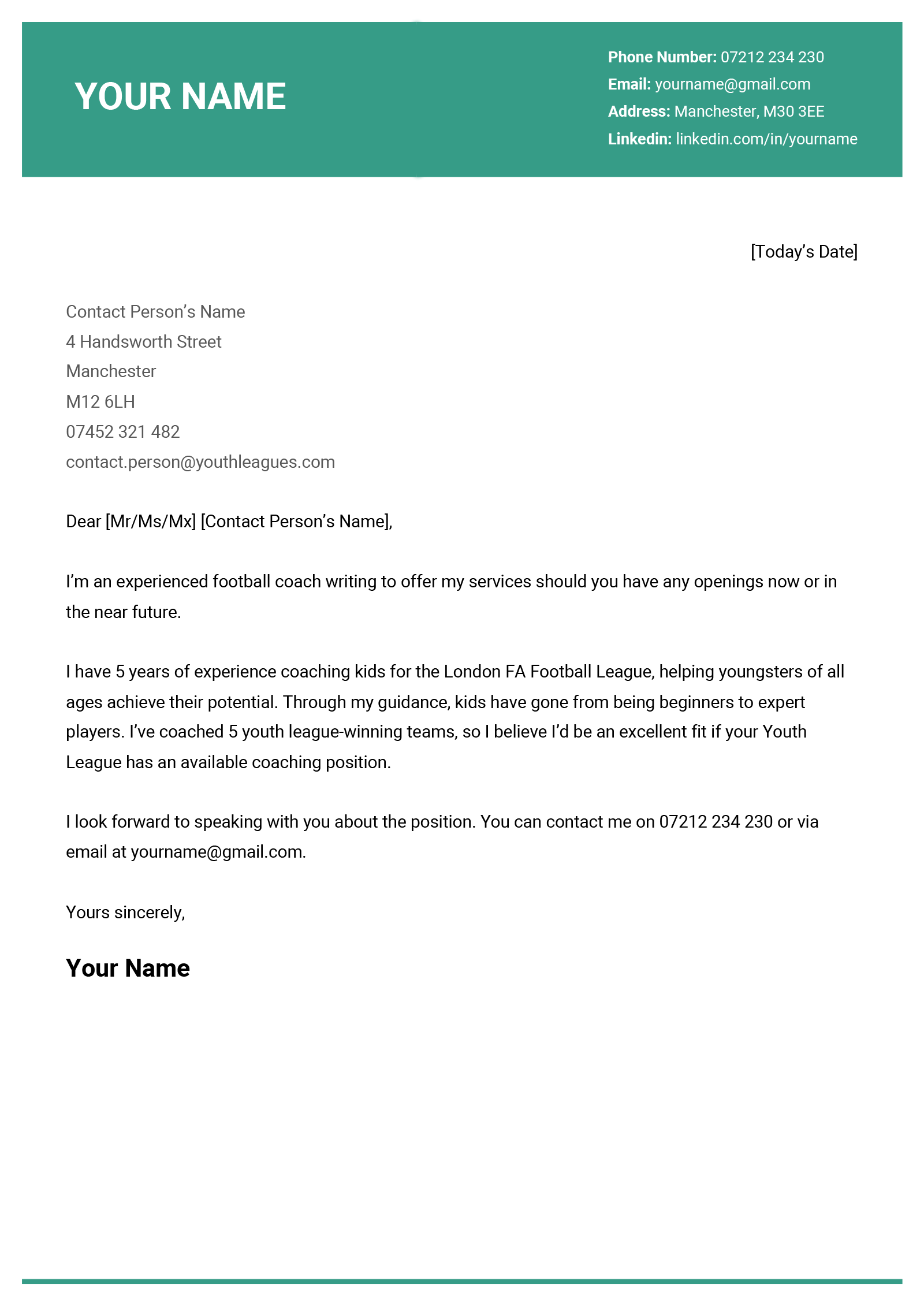

Short Cover Letter (Copy-and-Paste Text Version)
Your Name
Job Title
07212 234 230
yourname@gmail.com
Manchester
M30 3EE
linkedin.com/in/yourname
Today’s Date
Contact Person’s Name
4 Handsworth Street
Manchester
M12 6LH
07452 321 482
contact.person@youthleagues.com
Dear [Mr/Ms/Mx] [Contact Person’s Surname],
I’m an experienced football coach writing to offer my services should you have any openings now or in the near future.
I have 5 years of experience coaching kids for the London FA Football League, helping youngsters of all ages achieve their potential. Through my guidance, kids have gone from being beginners to expert players. I’ve coached 5 youth league-winning teams, so I believe I’d be an excellent fit if your Youth League has an available coaching position.
I look forward to speaking with you about the position. You can contact me on 07212 234 230 or via email at yourname@gmail.com.
Yours sincerely,
Your Name
This is a great example of a short speculative cover letter— in other words, one written to an employer to see if any unadvertised job openings are available. The applicant immediately explains why they’re writing an unsolicited cover letter, and then uses hard numbers to highlight their relevant achievements to back up their request for consideration.
2. Short cover letter example for early career applicants
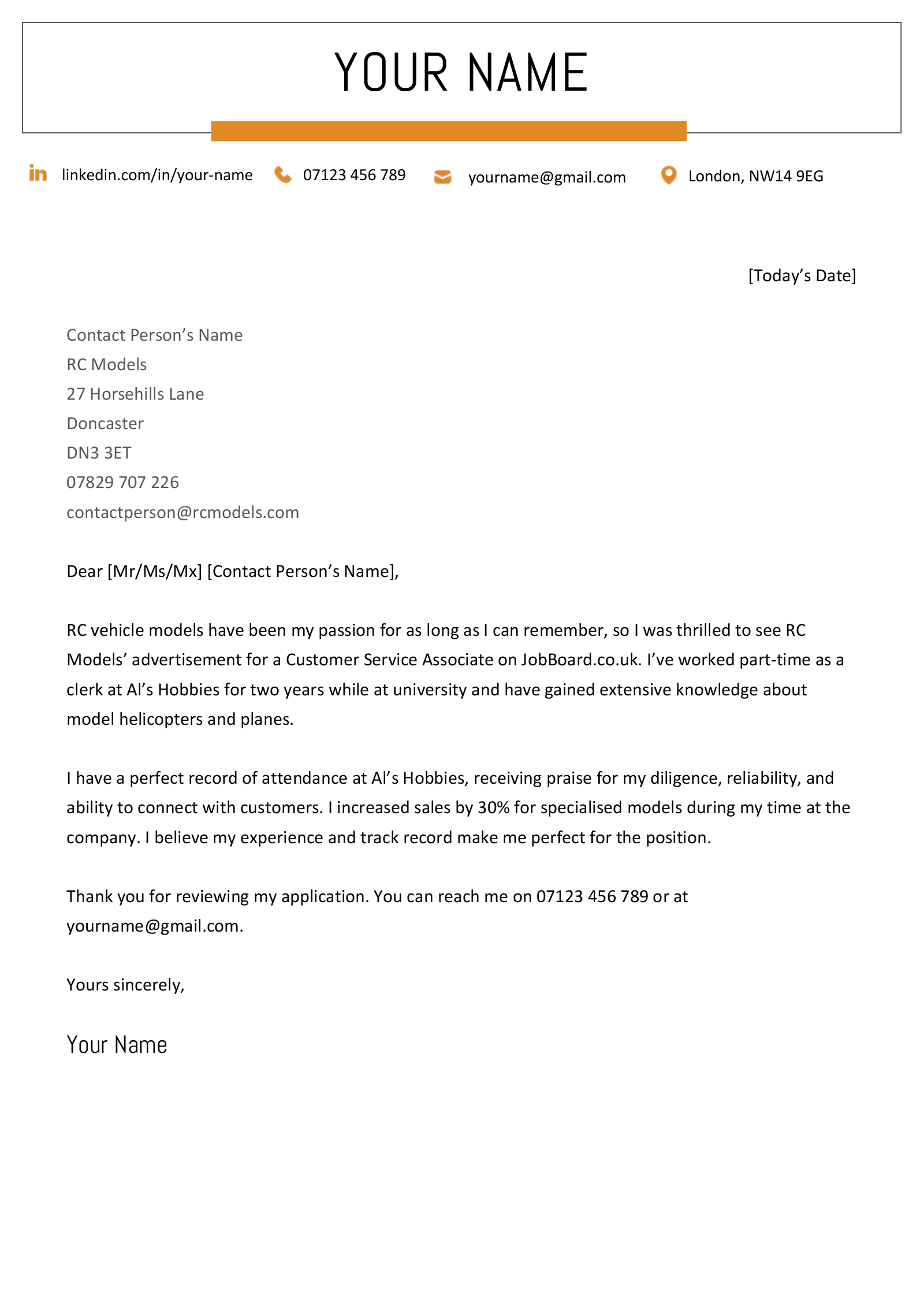

Short Cover Letter (Copy-and-Paste Text Version)
Your Name
Job Title
linkedin.com/in/your.name
07123 456 789
yourname@gmail.com
London
NW14 9EG
Today’s Date
Contact Person’s Name
RC Models
27 Horsehills Lane
Doncaster
DN3 3ET
07829 707 226
contactpersonsname@rcmodels.com
Dear [Mr/Ms/Mx] [Contact Person’s Surname],
RC vehicle models have been my passion for as long as I can remember, so I was thrilled to see RC Models’ advertisement for a Customer Service Associate on JobBoard.co.uk. I’ve worked part-time as a clerk at Al’s Hobbies for two years while at university and have gained extensive knowledge about model helicopters and planes.
I have a perfect record of attendance at Al’s Hobbies, receiving praise for my diligence, reliability, and ability to connect with customers. I increased sales by 30% for specialised models during my time at the company. I believe my experience and track record make me perfect for the position.
Thank you for reviewing my application. You can reach me on 07123 456 789 or at yourname@gmail.com.
Yours sincerely,
Your Name
When you’re early in your career, a perfect attendance record is an excellent point to showcase because it shows employers you’re a punctual and responsible worker.
Including numbers also provides context for employers because they can see what you’ll bring to their organisation.
3. Short cover letter sample for recent graduates
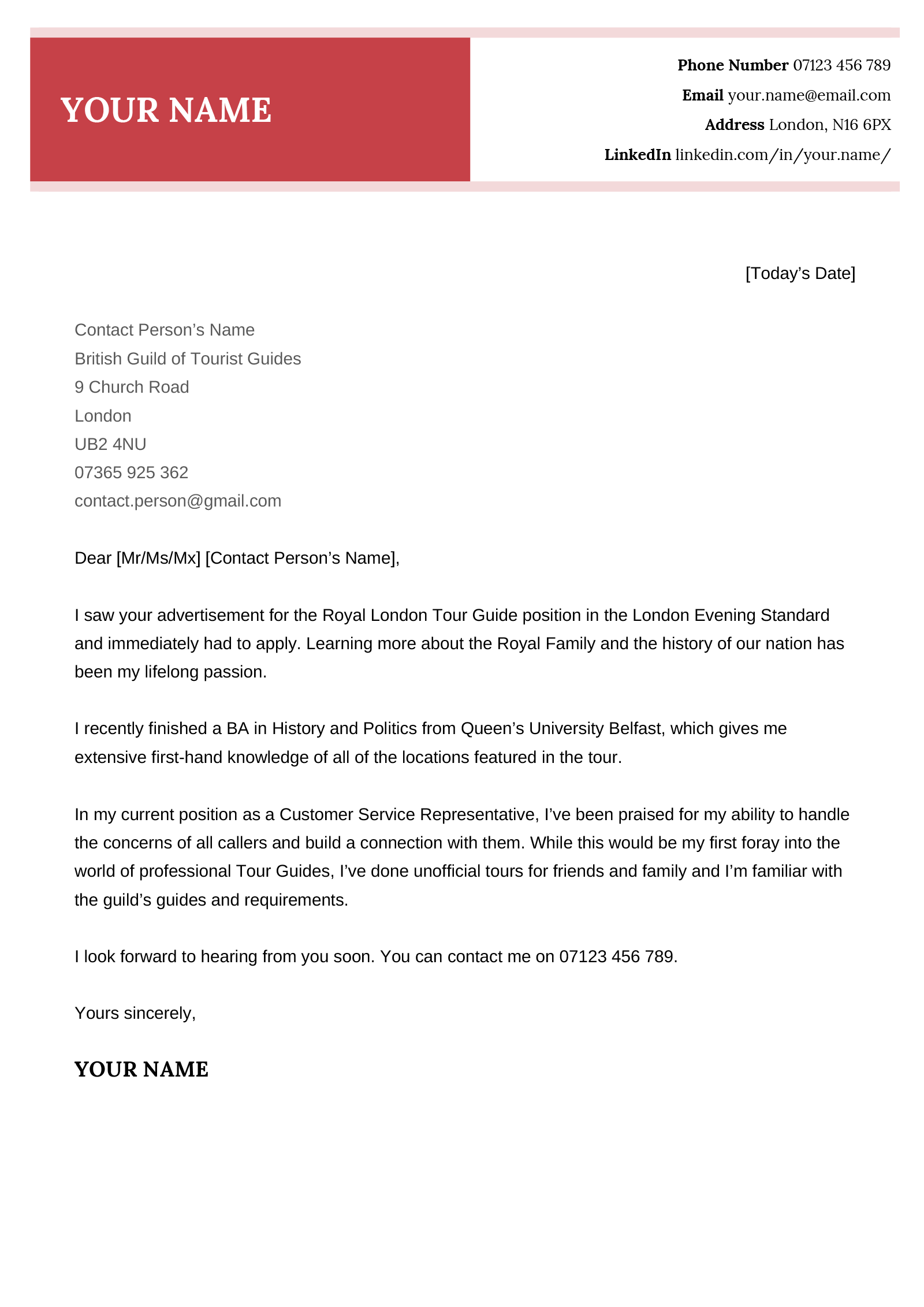

Short Cover Letter (Copy-and-Paste Text Version)
Your Name
Job Title
07123 456 789
your.name@email.com
London
N16 6PX
Linkedin.com/in/your.name/
Today’s Date
Contact Person’s Name
British Guild of Tourist Guides
9 Church Road
London
UB2 4NU
07365 925 362
contactperson@gmail.com
Dear [Mr/Ms/Mx] [Contact Person’s Surname],
I saw your advertisement for the Royal London Tour Guide position in the London Evening Standard and immediately had to apply. Learning more about the Royal Family and the history of our nation has been my lifelong passion.
I recently finished a BA in History and Politics from Queen’s University Belfast, which gives me extensive first-hand knowledge of all of the locations featured in the tour.
In my current position as a Customer Service Representative, I’ve been praised for my ability to handle the concerns of all callers and build a connection with them. While this would be my first foray into the world of professional Tour Guides, I’ve done unofficial tours for friends and family and I’m familiar with the guild’s guides and requirements.
I look forward to hearing from you soon. You can contact me on 07123 456 789.
Yours sincerely,
Your Name
This short cover letter sample focuses on the applicant’s knowledge and skills because, as a recent graduate, they don’t have any job-relevant work experience.
Specifically, they’re applying for a tour guide role, and thus highlight their passion for British culture, history degree, and familiarity with locations associated with this company’s tours. Emphasising their relevant interests shows the employer that they’ll fit in well at their organisation.
4. Short cover letter example for mid-career job seekers
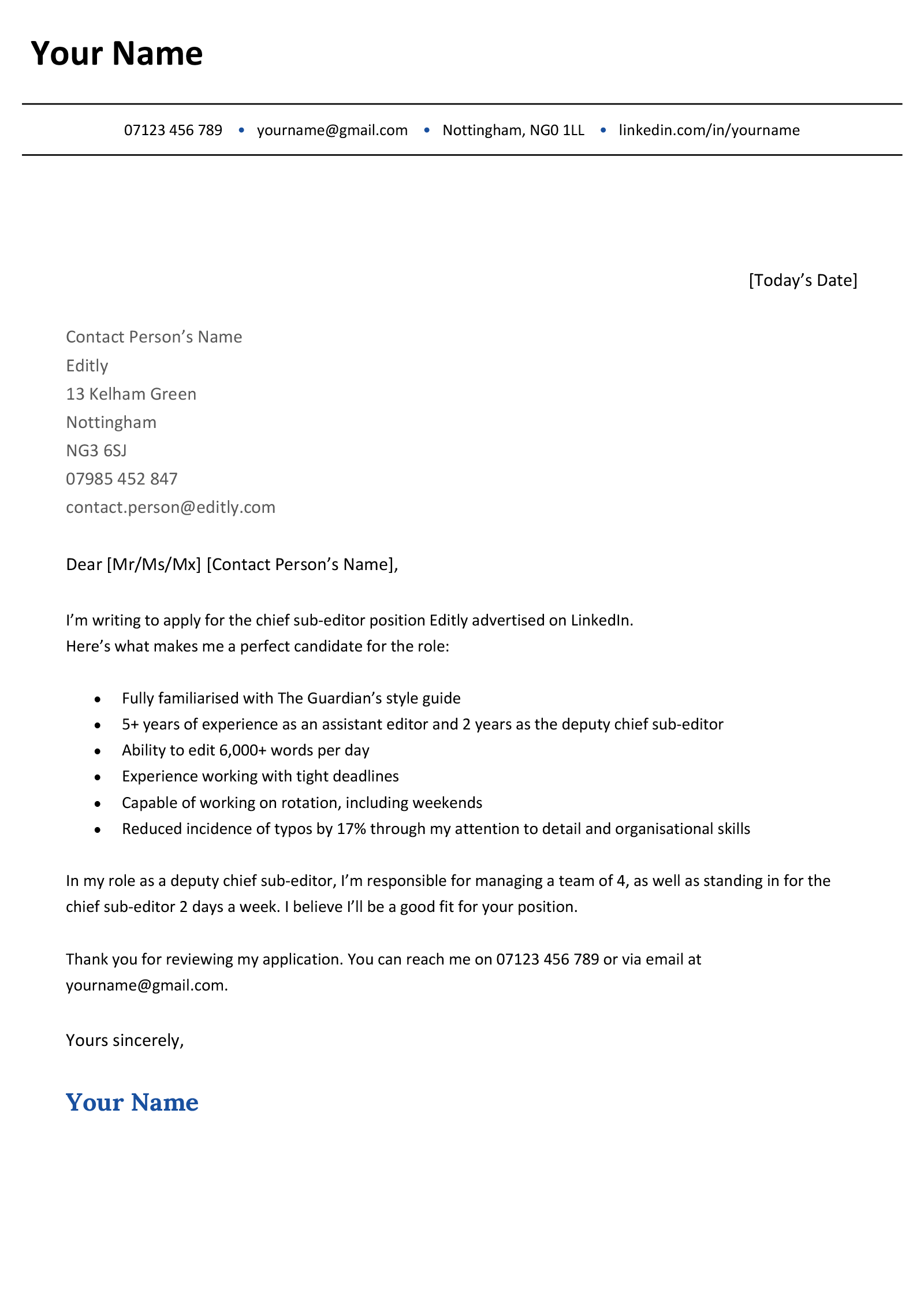

Short Cover Letter (Copy-and-Paste Text Version)
Your Name
Job Title
07123 456 789
yourname@gmail.com
Nottingham
NG0 1LL
linkedin.com/in/yourname
Today’s Date
Contact Person’s Name
Editly
13 Kelham Green
Nottingham
NG3 6SJ
07985 452 847
contact.person@editly.com
Dear [Mr/Ms/Mx] [Contact Person’s Surname],
I’m writing to apply for the chief sub-editor position Editly advertised on LinkedIn.
Here’s what makes me a perfect candidate for the role:
- Fully familiarised with The Guardian’s style guide
- 5+ years of experience as an assistant editor and 2 years as the deputy chief sub-editor
- Ability to edit 6,000+ words per day
- Experience working with tight deadlines
- Capable of working on rotation, including weekends
- Reduced incidence of typos by 17% through my attention to detail and organisational skills
In my role as a deputy chief sub-editor, I’m responsible for managing a team of 4, as well as standing in for the chief sub-editor 2 days a week. I believe I’ll be a good fit for your position.
Thank you for reviewing my application. You can reach me on 07123 456 789 or via email at yourname@gmail.com.
Yours sincerely,
Your Name
By using bullet points, the writer of this cover letter highlights their transferable skills while keeping their cover letter length manageable.
5. Short cover letter sample for healthcare workers
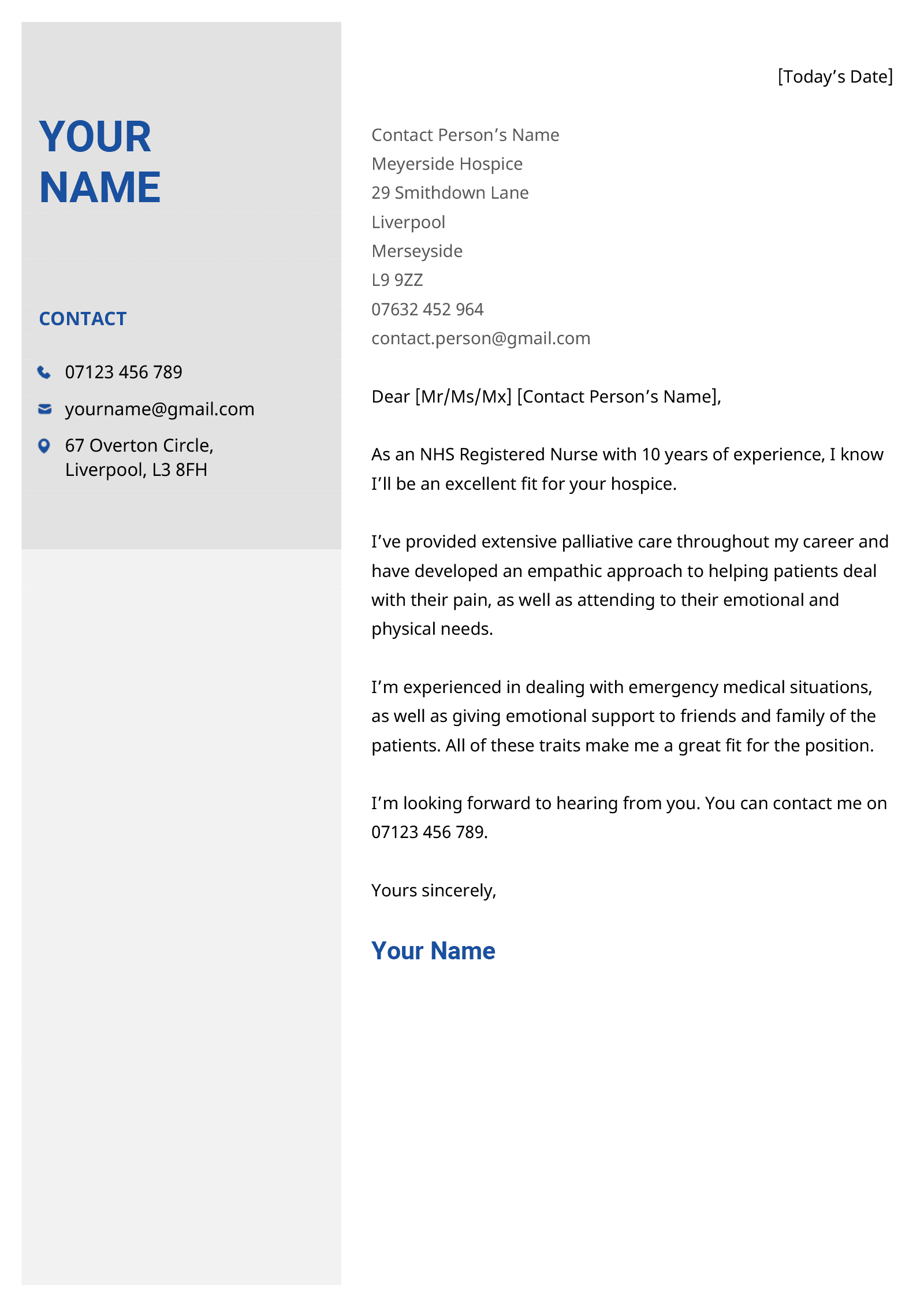

Short Cover Letter (Copy-and-Paste Text Version)
Your Name
Job Title
07123 456 789
yourname@gmail.com
67 Overton Circle
Liverpool
L3 8FH
Today’s Date
Contact Person’s Name
Merseyside Hospice
29 Smithdown Lane
Liverpool
Merseyside
L9 9ZZ
07632 452 964
contact.person@gmail.com
Dear [Mr/Ms/Mx] [Contact Person’s Surname],
As an NHS Registered Nurse with 10 years of experience, I know I’ll be an excellent fit for your hospice.
I’ve provided extensive palliative care throughout my career and have developed an empathic approach to helping patients deal with their pain, as well as attending to their emotional and physical needs.
I’m experienced in dealing with emergency medical situations, as well as giving emotional support to friends and family of the patients. All of these traits make me a great fit for the position.
I’m looking forward to hearing from you. You can contact me on 07123 456 789.
Yours sincerely,
Your Name
This brief cover letter example highlights the experience of the applicant and their transferable skills, such as their talent for handling patients with care.
How to write a short cover letter in the UK (5 tips)
If the thought of writing a short cover letter has you wringing your hands, consider using a cover letter builder that uses AI to write and format it for you. You can then tweak the content to tailor it to your situation.
You can also use a CV maker to build out the rest of your application.
But if you have time and writing skills, here’s how to write a cover letter that’s brief but still covers all the information you need to earn interviews:
1. Include every cover letter section
Here are all the sections to include in a short cover letter:
Parts of a cover letter
- Contact information (yours and the contact person’s)
- Greeting (address your short cover letter to the employer by name to personalise it — for example, ‘Dear Ms Jones,’)
- 1–2 body paragraphs
- Closing (request an interview and repeat your phone number and email for the reader’s convenience)
- Professional sign-off (‘Yours sincerely,’ followed by your name)
2. Use concise words rather than long phrases
A short cover letter is not the place for wordiness. Limit your word use by only using the necessary words to communicate clearly. A helpful way to write more clearly is by replacing wordy phrases with single words or other phrases with fewer words.
3. Mention only your most relevant skills and experiences
Focus only on relevant skills and experience for the position that you’re applying for when you write your short cover letter.
Matching the keywords used in the job advert in your cover letter is vital because employers scan cover letters for job-specific keywords to determine if applicants meet their requirements.
See how the applicant in this example tailors their cover letter to the job by using keywords they found in the job advert:
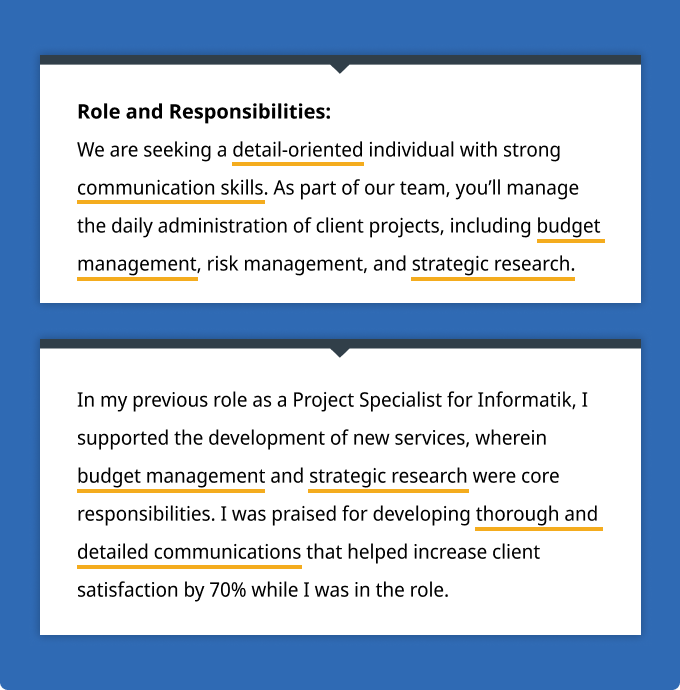

4. Format your cover letter efficiently
Using appropriate cover letter formatting helps you optimise the length of your cover letter.
Good cover letter fonts like Calibri and Times New Roman with a font size between 10.5 and 12 points make it easier for the employer to skim your covering letter for details.
Use 1.5 spacing to make your paragraphs read easily and quickly. Single spacing is also appropriate if you need to save space. However, it’ll also make your writing look denser and appear more of a bore to read.
You should also use the standard 2.5 cm margins for UK cover letters. If you still need more space, then try reducing your margins to 1.25 cm.
5. Proofread your cover letter
Reviewing your cover letter after it’s finished allows you to catch mistakes before you send it.
Read it aloud to identify complicated sentences or awkward wording. You can also use platforms like Hemingway App to check your writing is clear and concise.
Frequently asked questions about writing a short cover letter
Still have doubts about writing a brief cover letter for your job application? Here are the answers to four common short cover letter questions:
1. What is a good starting sentence for a cover letter
A good starting sentence for a cover letter is one that gets the employer’s attention and makes them interested in calling you for a job interview. It should include:
- your desired role
- the company name
- your most job-relevant information (e.g., years of experience, passion for your work, etc.)
Here are two examples of good cover letter openings:
- As a published poet with 5+ years’ experience teaching literature at the university level, I jumped at the chance to apply for the open Poetry Professor position posted on the University of York careers page.
- I’m a recent graduate with a Bachelor’s in Marketing and an internship at an advertising agency interested in Aviva’s available Marketing Associate role.
2. How short should a cover letter from the UK be?
A cover letter from the UK should never be longer than one page and only use between 250 and 400 words.
Anything longer than that is a pain for employers to read through, while anything shorter could make you appear lacking in qualifications or communication ability.
3. Is one paragraph too short for a cover letter?
A Redditor asked this question:
Your cover letter should have at least 3 paragraphs:
- An opening that introduces yourself and your experience to the employer while mentioning your desired job and the company name
- A body paragraph that connects your accomplishments to your target role
- A closing that requests a job interview and thanks the employer for reading your letter
Splitting this information into separate paragraphs makes your cover letter easier to read than if you put it in one big chunk of text.
However, you can make each paragraph 1–2 short sentences to keep your cover letter concise.
4. When should I not use a short cover letter?
You should not use a short cover letter when:
- the recruiter asks for a specific word count
- the job advert requires that you show your writing skills
- you want to emphasise relevant skills and experience that you only briefly mentioned when you wrote your CV
More FAQs to help you with your cover letter
Here are the answers to a few more cover letter questions you might have:
